| Spotlight

Journey back Home
-A Risky Venture
Promiti Prova Chowdhury
Photos: Kazi Tahsin Agaz Apurbo
Getting done with quizzes, assignments, project work, exams and coaching classes, alongside planning a budget, keeping the sky-high prices of commodities and transport in mind, the Holy month of Ramadan becomes chaotic for the students who live in Dhaka, away from their families. They yearn to get together with their families during Eid and vice versa. However, the home-bound Eid vacationers' journey does not particularly turn out to be an enjoyable affair in Bangladesh. People have to face problems that are often beyond description, only to savour the happiness of reunion with their near and dear ones. These include the eerie hike of ticket price--be it rail, bus or water transport, the much talked about but less addressed problem of battered road conditions, the oppression of brokers and black ticket sellers almost throughout the journey and much more. Getting a ticket of the desired transport and reaching the destination safe and sound and especially on time, seems unfeasible. After going through endless trials and travails, some do make it to their desirable destination while some fail.

The uncertain waiting in the long queus become excrutiating for students.
| |
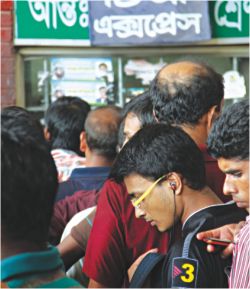 |
| |
Students have to spend almost a whole day at the railway station to buy a ticket. |
Zanifar Arefin is a student of third semester at the Department of Business Administration at American International University, Bangladesh (AIUB). She was more than delighted to have booked her bus ticket in advance, to her hometown, Bandarban. The more fascinating part was that, her journey started at night on August 8, the day her semester final exams ended. Though she was ecstatic to get the ticket of her desired day, the amount of the ticket price came out too harsh on her wallet. “As I have always known, the ticket for Dhaka to Cox's Bazar in the Business Class, costs Tk 1,650. I knew, for Eid it might increase a bit. But after reaching the bus counter I was flabbergasted to hear that it will cost Tk 2,150. But, anyhow I had to go, because nothing is more overwhelming than spending the Eid holiday and also the semester break with abbu-ammu (father and mother) at home.”
Disgusted with the journey by road, Kalpotoru Nirjan is taking the launch to go home, Barisal. He passed his HSC exams from Dhaka College this year. Nirjan says, “In 2011, I took a journey by bus to Barisal before Eid. The bus departed at around 10:30 at night and I reached my destination at 12:00 AM the next day. The worst part was crossing the ferry terminal at Paturia. It was like a nightmare. For almost seven hours we were stuck and there was no toilet or any shop for buying snacks or water nearby. The ordeal was not confined to this only. During this stuck up situation the vendors with pickles, cucumber, hog-plum, and jhalmuri, did a great deal of business. People who ate those, started falling sick inside the bus. One couldn't even get off the bus and inhale some fresh air for a while, as the area is known to be a hub of miscreants like thieves and molom parties.”
| |
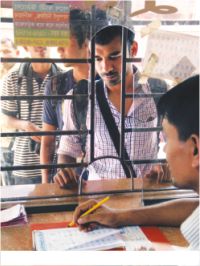 |
| |
Students might have to face an unusual fare hike
or unavailibility of tickets at the counter. |
Nirjan loves to travel lying on the deck of the launch with his friends, as he finds it really adventurous. Though he admits that it is not the proper way of travelling and can be a bit too risky as well, he chooses this option if he doesn't get a cabin. And to avoid the road congestion, he prefers the launch which takes only eight hours to take him to his destination. However, he says that there is a running black market in the ticket business. The price of a cabin for three people is sold at Tk 1000 which is usually sold at Tk 800. Sometimes he and his friends try to chip in and take the cabin to have a comfortable journey.
Speaking of black tickets, Muslima Jahan Setu, a student of Masters in Media Studies and Journalism at the University of Liberal Arts, Bangladesh (ULAB), expresses deep frustration. She has been living in Dhaka for eight years and travels to her hometown, Barisal regularly. But the illegal sale of black tickets becomes blatant during Ramadan, claims Setu. “When I go to the bus terminals, I see the ticket which was worth Tk 300 is offered at Tk 500. This happens at the counters of reputed bus services as well. The ridiculous part is that, the real price remains printed on the tickets. But at that time, everyone is in a rush for going home. Nobody asks any question. It is just like boarding a CNG run auto-rickshaw at a double rate during rush hours,” describes Setu. She adds, “I am a student and I bear my own expenditure. Moreover, in Ramadan, prices go up.”
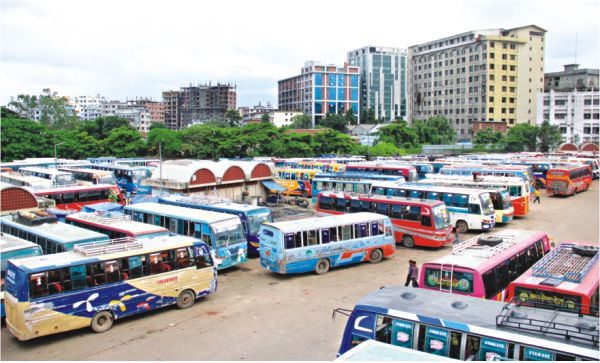
Many buses remain immobile due to the opression of black marketeers.
According to some students, the oppression of brokers hampers the bus journey while crossing the ferry terminals. Alauddin Al Azad, a Masters student of Economics at University of Dhaka (DU), blames the trucks to impede the journey. Azad lives in the Surya Sen hall of DU. He takes the bus to go toJessore. “While crossing the Padma, we have to sit for three to four hours just because the trucks grab an advanced serial number from brokers and go ahead,” says Azad.
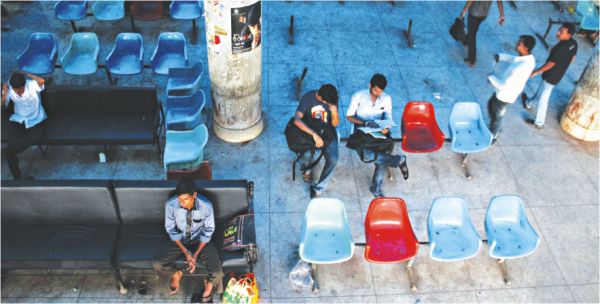
Delay in departure is a common scenario before Eid.
The business of black tickets has become so obvious that some students have even made a rapport with the sellers to get the tickets easily. Afsan Mahmud, from the same batch as Alauddin Al Azad, is too lazy to go to the railway station. “Either you have to start right after having seheri, or you have to have iftaar standing at the railway station, if you want to get an advanced ticket by waiting in the unusually long queue. Even after going through all this, there is no guarantee that you will get a ticket because a very less number of tickets are sold in advance. Majority of them are sold in the black market at the eleventh hour,” opines Afsan. Afsan is heading towards his home town, Cox's Bazar. He has friends who know some black marketeers. Whenever they get a call from them, they go and collect their tickets.

People have no choice but to wait it out.
Romesh Chandra Ghosh, Managing Director of Shyamoli Paribahan, one of the largest bus service providers in the country with around 400 buses in its fleet, and Vice-President of Bangladesh Bus-Truck Owners' Association, said, “The black tickets are sold by less reputed bus services. Bus services like Shyamoli, Shohag and Greenline, sell tickets at the rate fixed by the government. The Eid tickets are kept sealed separately and the contact number of each buyer is noted. So the records of who has bought how many tickets are preserved. One person can buy maximum seven tickets at a time.” Regarding reaching destination late, he said, “We have appealed to the Shipping Minister, Shahjahan Khan, and he has assured us that this year, no trucks will be allowed to cross the ferries from three days before Eid.”
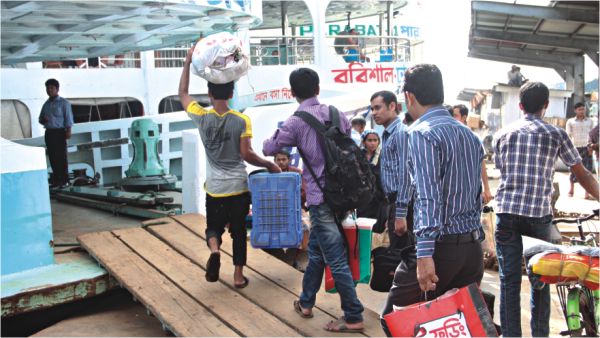
Even if some prefer taking the launch, the fear of drowning remains as launches are usually overloaded.
However, regarding the much complained about issue of fare hike, he said, “As very few number of people return to the capital during Eid, sometimes the up-down fare is charged.” He hopes that this year, the home-bound people will have a smooth journey if any natural calamity does not occur.
The students, who live away from their families, face a great deal of pressure in this city-- pursuing education, doing part-time jobs, adjusting with the atmosphere of hostels, messes and/or dorms, and overall, maintaining a living-- altogether makes them exhausted sometimes. Eid holiday is a time when they get back to their roots and get revived. But this journey has become a risky venture in our country. Every year we see the same picture and the problems are unaddressed. Necessary steps should be taken without delay as the 'journey back home' is supposed to be joyous and peaceful for all.
|
